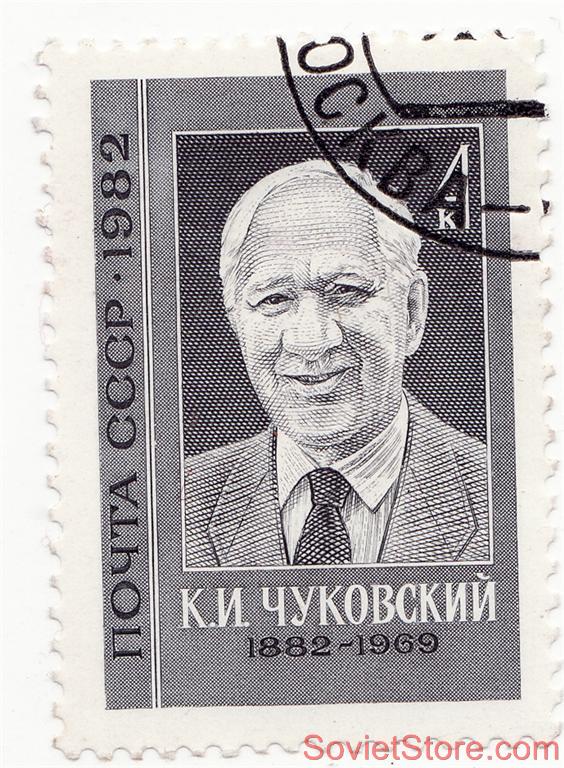SearchProduct Type
|
Add us to: Favorite Stores
Stamp Authenticity Since 1939 till 1990 Lithuania suffered 3 occupations: 1 German (1941-1944) and 2 Soviet (1939-1941, 1944-1990), one of which lasted 46 years. In WWII occupations were based on violent battles between Germans and Russians. These historical events left a lot of stuff behind them selves. Almost every family in Lithuania has something left, related to USSR history in their forgotten drawers. So we are just traveling around lithuanian countrysides and collecting this memorabilia. Item is original, genuine, authentic, unique, not a copy or replica - has 2-12 decades of it's own unique history.
Stamp Story
Korney Ivanovich Chukovsky (Russian: Корней Иванович Чуковский, March 31 NS 1882 - October 28, 1969) is probably the most popular poet for children in the Russian language. His poems Doctor Aybolit (Айболит), Giant Roach (Тараканище), Crocodile (Крокодил) and Wash'em'clean (Мойдодыр) have been favourites with many generations of Russophone children. He also was an influential literature critic and essayist. Early lifeNikolay Vasilyevich Korneychukov was his original name (Russian: Николай Васильевич Корнейчуков), which he reworked into his now familiar pen-name while working as a journalist in Odessa News in 1901. He was born in St.Petersburg, an illegitimate son of Ekaterina Osipovna Korneychukova (a peasant girl from the Poltava region in Ukraine) by Emmanuil Solomonovich Levinson, from a wealthy Jewish family (on the legitimate line he was the grandfather of mathematician Vladimir Abramovich Rokhlin). Levinson's family did not permit their marriage, and they eventually separated. Korneychukova moved to Odessa with Nikolaj and his sibling. Levinson supported them financially for some time until his marriage to another woman. Nikolay studied in Odessa gymnasium, with Vladimir Zeev Jabotinsky as a classmate. Later Nikolay was expelled from the gymnasium for his "low origin" (an euphemism for illegitimacy). He had to get his secondary school and university diplomas by correspondence. He taught himself English, and, in 1903-05, he served as a correspondent of an Odessa newspaper in London, where he admittedly spent his entire time in British Library instead of the press gallery in the Parliament. Back in Russia, Chukovsky started translating from English (notably from Walt Whitman) and published several analyses of contemporary European authors, which brought him in touch with leading personalities of Russian literature and secured the friendship of Alexander Blok. His influence on Russian literary society of 1890s is immortalized by satirical verses of Sasha Cherny Korney Belinsky (allusion on the famous critic Vissarion Belinsky). Later the publications of the time was published in the books From Chekhov to Our Days (1908), Critique stories (1911), Faces and masks (1914). He also published a satirical magazine Signal (1905-1906) and was arrested for "insulting the ruling house" but was acquitted after six months. Later life and worksMayakovsky's cartoon of Korney Chukovsky
It was at that period that Chukovsky produced his first fantasies for children. As the 2004 Encyclopædia Britannica put it, "their clockwork rhythms and air of mischief and lightness in effect dispelled the plodding stodginess that had characterized prerevolutionary children's poetry". Subsequently, they were adapted for theatre and animated films, with Chukovsky as one of collaborators. Sergei Prokofiev and other composers even adapted some of his poems for opera and ballet. His works were popular with the emigre children as well, as Vladimir Nabokov's complimentary letter to Chukovsky attests. Boris Pasternak (L) and Korney Chukovsky at the first Congress of the Union of Soviet Writers in 1934.
During the Soviet period, Chukovsky edited the complete works of Nikolay Nekrasov and published From Two to Five (1933), a popular guidebook to the language of children. As his invaluable diaries attest, Chukovsky used his popularity to help the authors persecuted by the regime including Anna Akhmatova, Mikhail Zoshchenko, Alexander Galich and Aleksandr Solzhenitsyn. He was the only Soviet writer who officially congratulated Boris Pasternak on his having been awarded of the Nobel Prize. His daughter Lydia Chukovskaya is remembered as a lifelong companion and secretary of the poet Anna Akhmatova. Starting from the 1930s, Chukovsky lived in the writers' village of Peredelkino near Moscow, where he is buried. At one point his writings for children were under severe criticism. Nadezhda Krupskaya was an initiator of this campaign, but inadequate criticism came also from children's writer Agniya Barto. For his life-time works on Nekrasov he got D.Sci in philology, Lenin Prize (1962, for his book, Mastery of Nekrasov) and an honorary doctorate of Oxford University in 1962. The free listing tool. List your items fast and easy and manage your active items. On Jun-12-08 at 14:47:55 PDT, seller added the following information:
| Return
Items must be returned within 30 days .
Refund will be given as Money back. Refund policy details: Return is accepted at any reason. Item(s) must arrive to us not later then 30 days after it was shipped out (you will be informed about this immediately after it will be done). Returned items must be the same item in the exact same condition as originally shipped. Refunds are for the final eBay item purchase price only, less a 10% restocking fee. Shipping costs, insurance, and handling charges (if any) are non refundable. Returns must be shipped insured. Shipping
Payment Method
Insurance
Not Offered (Domestic)
|
Shopping Cart |
|||||||||||||||||||||||||||||||||||||||||||||||||





